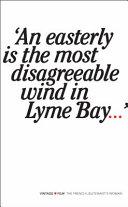Quotes from book
The French Lieutenant's Woman

The French Lieutenant's Woman is a 1969 postmodern historical fiction novel by John Fowles. It was his third published novel, after The Collector and The Magus . The novel explores the fraught relationship of gentleman and amateur naturalist Charles Smithson and Sarah Woodruff, the former governess and independent woman with whom he falls in love. The novel builds on Fowles' authority in Victorian literature, both following and critiquing many of the conventions of period novels.Following publication, the library magazine American Libraries described the novel as one of the "Notable Books of 1969". Subsequent to its initial popularity, publishers produced numerous editions and translated the novel into many languages; soon after the initial publication, the novel was also treated extensively by scholars. The novel remains popular, figuring in both public and academic conversations. In 2005, Time magazine chose the novel as one of the 100 best English-language novels published between 1923 and 2005.Part of the novel's reputation is based on its expression of postmodern literary concerns through thematic focus on metafiction, historiography, metahistory, Marxist criticism and feminism. Stylistically and thematically, Linda Hutcheon describes the novel as an exemplar of a particular postmodern genre: "historiographic metafiction." Because of the contrast between the independent Sarah Woodruff and the more stereotypical male characters, the novel often receives attention for its treatment of gender issues. However, despite claims by Fowles that it is a feminist novel, critics have debated whether it offers a sufficiently transformative perspective on women.
“We all write poems; it is simply that poets are the ones who write in words.”
Source: The French Lieutenant's Woman
“There is only one good definition of God: the freedom that allows other freedoms to exist.”
Source: The French Lieutenant's Woman (1969), Ch. 13, p. 99
“We are all in flight from the real reality. That is the basic definition of Homo Sapiens.”
Source: The French Lieutenant's Woman
“I am infinitely strange to myself.”
Source: Charles to Sarah in Ch. 47, p. 340 note: The French Lieutenant's Woman (1969)
“It is only when our characters and events begin to disobey us that they begin to live.”
Source: The French Lieutenant's Woman